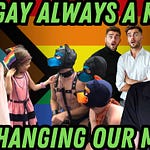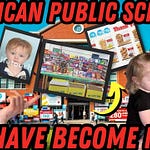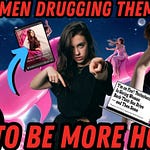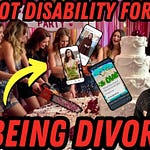I told Simone uploading this was a bad idea but she insist I am just being a wuss. In it we discuss how LGBT culture has become a way for white people to express pride - something not allowed through other outlets - and that that this function of LGBT culture has facilitated the expansion of definitions within it.
AI Generated Transcript:
Simone: [00:00:00] I think what really did resonate with me was this Backdoor to pride, even if you are white. And I wonder if that's why there's creep into the PRIDE community.
Simone: I was just listening to commentary today. On the addition of, for example, poly people maybe to L G B T QA plus Pride and also Asexual people many people complain , well, asexuality is more like a hormone imbalance than it is a sexuality. But then , where do you draw the line?
Simone: If in the end, maybe someone being gay or trans or any other things could be a product of their hormones, which could even be influenced by things that their mothers did or did not do, did or did not consume, were, or were not exposed to. So I feel like there's this really interesting gradation.
Simone: At any rate, Maybe why some people are really drawn to try to loop themselves in to things like Pride month. When they are, for example, just asexual, or poly maybe that's to say like, I wanna be proud about something about myself culturally, something about my people and my [00:01:00] tribe.
Simone: And I also think that like, I don't know of the people I know who are asexual, who are poly, they are overwhelmingly white, overwhelmingly on the wealthier and more educated end of the spectrum.
Simone: I do think it's telling that of all the places where I've been in the world,
Simone: that where we see pride most. I guess openly and enthusiastically celebrated is also where white culture is also super not cool to celebrate. Like I was just thinking about like, where's the only other place where I've seen like, enthusiastic celebration of L G B T
Simone: can you guess? I don't know, Germany,
Malcolm: Like big time. Oh, interesting. Yeah. They do have bigger pride events in other
Simone: places. Yeah.
Simone: Pride in coastal cities, is the strongest,
Simone: Cause when I think about like the best, like gay pride parades I've been to or drag shows or like events in general. San Francisco, obviously DC Cape Cod, like just,
Malcolm: oh yeah. Those are definitely locations where you would have the highest amount of cultural shame
Simone: With this [00:02:00] new model of L G B T as laundered white pride do you view it any differently? Like, I don't know what to make of it yet in my head, I think I, I'm gonna, well, I feel
Malcolm: kindness. It's not great to grow up feeling like your ethnic group is wretched and deplorable and like intrinsically genetically or culturally worse.
Malcolm: Than all other groups. And not everybody raises their kids believing this, but , there definitely is a portion of the population that raises their kids believing this. And I think that portion of the population's kids is a portion that is most likely to end up identifying its L G B T.
Malcolm: I don't see it as a bad thing really, because it's better than these kids having nothing they can have pride in. Yeah. Yeah. Especially if you buy this, meme that there's just something intrinsically immoral about white people or whiteness, which exists within certain cultural groups, especially in the, San Francisco, New York area.
Malcolm: People started basing their identities off of the [00:03:00] state of the Sexual identity research 20 years ago.
Malcolm: And now if you. Update the research. Like if the research finds new things, well then you've undermined someone's identity, right? So you can't update, it's now canon, it's now whatever the state of the field was 20 years ago. That's canon. Even if it doesn't align with the actual data, which is, one of the things that we point out in our book is the concept.
Malcolm: Of even gay and straight is probably not a really effective way of talking about yeah. Sexual identity
Simone: Hello, Malcolm. Hello
Malcolm: Simone. What are we gonna talk about today? Is it White Pride
Simone: you? You shared with me the most interesting theory about White Pride this morning. I would love for you to expand upon it. Let's dive into it. Yeah,
Malcolm: so one thing that we were talking about was this concept that, you know, generally.
Malcolm: When you're looking at falling fertility rates, one of the things that's really associated with cultural groups [00:04:00] that have been able to maintain their fertility rate is pride in that cultural group. Like a belief that we are a good thing in the world and more of this thing should exist. And we argue this is one of the reasons why Jewish populations have been so resistant to fertility collapse because a lot of the times, you talk to a Jewish person and they're like, I want more Jewish people to exist in the future.
Malcolm: And Okay, so that, that makes a lot of sense. But when you're talking about white people more broadly, like Caucasians, generally, I think that there's this belief that if they have any pride in an aspect of who they are or their culture, that is white pride and it is evil, right?
Malcolm: The interesting thing is there has been a group that has come with a message that says, oh, actually, if you join our cultural group now you can be white and have pride in the cultural group you've joined, and this is the lgbtq plus population.
just for some statistics here. [00:05:00] Gay married couples have a hae higher, medium household income than opposite sex. Married couples. But their poverty rates are about equal. And, if you look across the us population, you actually see higher rates. I have black and Hispanic LGBT identification currently. But this disappears and becomes the opposite. When you correct for age, this is more because there are more younger, black and Hispanic people in the general population.
Malcolm: And I think the real smoking gun, that this is what's happening, that it is allowing predominantly white, middle, and upper class individuals who otherwise are told by society they can't have pride in anything. Well, now you're allowed to have pride, is that it has now becoming kind of offensive to discuss.
Malcolm: That being gay is something you're born as, or being trans is something you're born as. And if you think this is an offensive thing to discuss and you're like no. Nobody thinks that's offensive to [00:06:00] discuss. Well, okay, so there's a recent study
Malcolm: Simone, why don't you talk about this
Simone: study, right? Yeah. Cause I was the one to first get really freaked out about it. One group of researchers looking at the presence of endocrine disruptors in first trimester mothers found that mothers with elevated levels of endocrine disruptors also saw Higher rates of boys born essentially with like less transition to full maleness.
Simone: So for example, the distance between the anus and the penis was shorter, sort of like that developmental stage happened less completely, less successfully. And then around age eight boys who in utero in first trimester, Had mothers with higher concentrations of endocrine disruptors in their bloodstreams also showed less, we'll say, dimorphic male play.
Simone: So they, they played more like girls, essentially which indicates that there are exogenous factors that could affect the extent to which someone shows certain dimorphic [00:07:00] gendered behavior. As well as physiological
Malcolm: traits. So I was bringing up this study was an African friend of mine, like from Africa.
Malcolm: It's a slightly different cultural background. They're not as up to date with like modern American progressive culture. And I was like, well, and of course I don't really talk about this study publicly much because they'd be seen as wildly offensive to trans people. And they were like, wait, why would that be if it wouldn't that like.
Malcolm: Be an argument that would show that the explosion in the trans population could be a biological change and that these people aren't imagining it, and that there really is like a lower gender differentiation or many more people being born, actually the opposite gender. And I was like, that's an interesting point.
Malcolm: I started thinking like, why is this? Such an offensive concept to these communities when it seemingly the way that when I grew up, the gay community, you were born gay, you were born trans, and that was a defense for that community. And what I realized is now. It's considered [00:08:00] offensive to either say that you were born gay or to say that you're definitively not born gay.
Malcolm: And it's a choice. It's the same with the trans community, right? It's like they wanna keep this in a box. They don't want anybody asking these questions or saying that it could be something that you were born as. And so the question is why would you wanna keep that in a box? Well, the reason you would wanna keep it in our box, because so long as people aren't born gay or born trans, if anyone can become gay or trans like the old political lesbians, uh oh, okay.
Malcolm: These were a group of feminists who believed that it was immoral to be heterosexual because you are like benefiting men. But if you say that anyone can become, can join the LGBTQ plus community, well then you have fully opened it to the entire like white upper class community to join. Because this pride offering is more valuable to them. But I'd love to hear your thoughts on this, Simone.
Simone: This stuff is hard for me. I think what really did resonate with me [00:09:00] was this Backdoor to pride, even if you are white. And I wonder if that's why there's creep into the PRIDE community.
Simone: I was just listening to commentary today. On the addition of, for example, poly people maybe to L G B T QA plus Pride and also Asexual people like many people complain like, well, asexuality is more like a hormone imbalance than it is a sexuality. But then like, where do you draw the line?
Simone: If in the end, maybe someone being gay or trans or any other things could be sort of a product of their hormones, which could even be influenced by things that their mothers did or did not do, did or did not consume, were, or were not exposed to. So I feel like there's this really interesting gradation.
Simone: At any rate, Maybe why some people are really drawn to try to loop themselves in to things like Pride month. When they are, for example, just asexual, which really hasn't subjected people to that much discrimination throughout history. Aside from maybe them being obligated to [00:10:00] have sex in some relationships and they're not that into it, which I don't know, I'm not too worried about or poly maybe that's just trying to get into that to say like, I wanna be proud about something about myself culturally, something about my people and my tribe.
Simone: And I also think that like, I don't know of the people I know who are asexual, who are poly, they are overwhelmingly white, overwhelmingly on the wealthier and more educated end of the spectrum.
Simone: So I do see that. Because I don't think also especially white, wealthy, and educated people are.
Simone: Allowed that much to even have pride in, for example, like being graduates of the school they graduated from, which in the past used to be huge.
Malcolm: Right? Yeah. Because that's a sign of status. So it would of course be seen as a negative thing to show pride in because it would be like class status or
Simone: well aspirational status.
Simone: If you have victim hub status, yeah. Then it's fine. You have to be the, adventurous, enlightened, educated. Victim or the, that sounds outgoing victim. Something like that. Yeah. Well, it's a ne the victim tag [00:11:00] is necessary if you want to be I guess palatable from a public relations standpoint, which is why that was such a good South Park joke.
Malcolm: Well, and I think that this is something that you point out where when we talk about this as a cultural group that's really selling with pride we mean this quite literally to the extent, and we've, I think we've mentioned this in another podcast that we would count by their community's rules as L G B T, both of us because we would both at least be a gender, which is a form of gender queer, which is a form of trans.
Malcolm: And I, I was talking to some from aggressive friends and they go, agender isn't a form of gender queer. And it's like y Yes it is. It's defined that way by most of the major L G B T organizations. If you don't believe me, just go Google. Definitions of gender queer that are found on these organization's websites and agender will clearly be under the definition.
Malcolm: And when I say aj, it's just, it doesn't really matter to me that I'm a guy.
Malcolm: Like, if I woke up tomorrow and I was a woman, I'd be like, fine I'll find a way to make this work. [00:12:00] Yeah, we just make it work. Doesn't matter. I'm gay, but I'd find a way to make it work. And I, and Simone feels the same way.
Malcolm: So what we mean by that is even us within the community, we could just say we are L G B T.
Malcolm: But I don't identify with that community. And because of that, I am not I do not think that the correct way to deal with not having a strong attachment, like really caring that much, that I'm a guy. I don't think the way to deal with that is to incorporate that into a major aspect of my identity and then say, okay, well these are my people now and this is my thing now.
To be more pointed. Our gender identity is about as important to our actual identity as our favorite color is. It just doesn't matter that much. In the future, we're going to do a video. On the difference between supporting people who are, for example, same sex attracted and supporting people who adapt the [00:13:00] gay identity and gay lifestyle.
, we believe both of the things should be done, but they are two very different things and it is possible to support the gay identity . Well, being terribly oppressive. To same-sex attracted people
. Who choose different lifestyles for themselves. For example, heterosexual marriage.
Because they choose to stay within a traditional faith or a traditional culture because you tell them, well, you don't get to adopt
Any same sex attracted identity. Unless you live this very specific lifestyle. So because of the way you're born.
Uh, our cultural group gets dominion over the rest of your life and is the only correct way to live that life.
You no longer get to choose your culture. Or identity. Because of the way you were born.
And, , I think. It's really. Important. Two. Both support. The LGBT community [00:14:00] and gay people living within that cultural lifestyle. And same-sex attracted people or gender dimorphic, people who choose other cultural responses to, something that they had no control over.
Malcolm: And so. I mentioned all this just to show how expansive it is. The more you learn about all of the different gender identities, whether it's demisexual or et cetera, you will see that just about anyone can find a way to identify as L G B T these days.
Malcolm: Even if you don't choose what most people would think of as a really non-normative gender or sexual attraction. Now, another area where I think is really interesting is it as the community expands, expanding to the poly community also has been expanding into the king community with people of the king community, now identifying as and this is a community where.
Malcolm: Yeah. You might get shame if you mentioned this stuff at the office, but I really don't think they're discriminated against the group in the traditional context. And it [00:15:00] is interesting that you see within the pride events, within the, the existing L G B T Pride events, pride is so much more important.
Malcolm: To their cultural message and sales pitch than it is to other minority cultures. Or I could be wrong here. Like, do you think that's accurate,
Simone: Simone? It's really hard to say. I do think it's telling that of all the places where I've been in the world, and I'm not saying I've been everywhere, but like I sort of, we, you and I collectively have traveled decently throughout Europe and Asia, right?
Simone: That where we see pride most. I guess openly and enthusiastically celebrated is also where I don't know how to say this. White culture is also super not cool to celebrate. Like I was just thinking about like, where's the only other place where I've seen like, enthusiastic celebration of L G B T and even like sort of BDSM culture.
Simone: Can you guess? I don't know, Germany, [00:16:00]
Malcolm: Like big time. Oh, interesting. Yeah. They do have bigger pride events in other
Simone: places. Yeah. Then and like, like also like just, like bonded shops, like much more like open and so that, I feel like that's more more culturally celebrated.
Simone: Pride in coastal cities, in liberal areas is the strongest, but I would also say that white pride is strongest in the south.
Simone: In the south, like you, I mean like people are still flying like confederate flags and whatnot. There is actual more white pride and there's more resistance to not having white pride and that therefore there's less. Per our theory or model here of a drive or demand to have alternate channels for pride as a white person, if that makes sense.
Simone: Yeah, that makes sense. Cause when I think about like the best, like gay pride parades I've been to or drag shows or like events in general. San Francisco, obviously DC Cape Cod, like just,
Malcolm: oh yeah. Those are definitely locations where you would have the highest amount of cultural shame. Yeah,
Simone: yeah.
Simone: Whereas like in the south that you're, I [00:17:00] don't think there's much R reason also because I think there's a lot more, even if we're like, I. Independent of Confederate stuff, like, there's still just a lot more, there's the debut top balls. There's like, there's actual like sort of historical white culture, well, don't
Malcolm: pride in like their religious groups often,
Simone: which is yeah.
Simone: There's more like, I'm proud to be a Baptist or whatever. Yeah. Whereas you don't get that in coastal cities, so like, because there are more outlets for a white, middle to upper class, or even like lower, like impoverished, even. Like, there are lots of channels there. And yet, Yeah, in, in coastal cities and North, you really don't see that, hence maybe more L G B T, et cetera.
Simone: Pride.
I think there may be a tendency to dismiss this as being a sign of just how liberal and area is. However, if you look at places like Cuba, You do not see large pride events. In fact, , gay marriage wasn't even legalized until 2022.
Malcolm:
Malcolm: Well, I think that this is really interesting. [00:18:00] Um, If. That it is sort of, uh, white pride laundering um, in the same or something. Oh
Simone: my God.
Malcolm: Like pride. You're gonna launder our white pride and, and, and have these big parades about it. But we're gonna pretend it's not a white pride parade. Oh, Oh my God.
Malcolm: And after I had this realization um, I'm never gonna be able to see gay. Is anything else Just giant white pride parades of people who say that, oh, I'm not a white, I'm not, you know, pro. No. Uh, which, Which is interesting because this isn't what the gay community used to be. And I think that this is important to note, is that the gay community used to be people who were born gay and had to live their entire lives, like really discriminated for this For sure.
Malcolm: It, like, it was shitty. To grow up being gay in like the eighties. Right. Or before. But back then the Pride parade were a lot more timid I think, than they are today.
Simone: Well, they certainly weren't like, dominated like they are these days by [00:19:00] like parade floats from Bank of America, it's
Malcolm: Right.
Malcolm: But I, I think that historically if you were in the eighties and you went up and you said, I am L G B T, right? And yet your form of sexuality or gender identity did not lead to you being significantly discriminated against the community would've been like, that's a little offensive for you to say that.
Malcolm: If you were like a gender or something like that or like, a demisexual or you were something that like, didn't mean that you had to live a lifestyle that caused you to constantly be attacked in the way that they were constantly attacked. And victimize.
Malcolm: But the community has sort of been taken over. To an extent by this cultural virus, which is expansive, and now it's a cultural group. It's no longer a, we were born this way and there's nothing we can do about it. It's joining us in this cultural group, which yes, some of the people in this cultural group didn't choose it.
Malcolm: But a lot of people in this cultural group, this is an opt-in thing, like we were talking about [00:20:00] with polyamory.
Simone: Yeah. Well, And I guess also it's very easy to find one of these groups that you can identify with. For example, in our sexuality research, we found that women aren't really, that attracted, like primarily to primary or secondary sex characteristics.
Simone: Like not, sexual body parts, but rather dominance and submission. So that means that, like you could argue, and this has shown up in other research too, that the majority of women are sort of. By default, bisexual. So instantly like you can opt into that. I think the majority of women don't choose to identify as bisexual, but like if you need that outlet, you can find it.
Simone: I think that's the most important part of this is that. Maybe um, uh,
Malcolm: and we now have a better understanding of how malleable our sexuality is because so many people Right, are taking gender hormones. Right. And we now know that, when you're on gender hormones, you have a 25% chance of changing the primary gender you're attracted to.
Malcolm: Um, Oh yeah.
Simone: [00:21:00] Well, yeah. And people describing once they go on testosterone or once they go on estrogen, just the extent to which they feel super different is meaningful. Even. Me I have hypothalamic irr. I don't have periods on my own, meaning that I have to take like tons of estrogen to sort of like function normally as a female, I can tell the difference.
Simone: And I, it's one of those things that really frustrates
Malcolm: me. This like, you're pretty ace.
Simone: Um, Malcolm, sorry, you're gonna have to start that over. Um, if you could start after just like right when you interrupted me, that would be good cuz that's where you broke up.
Malcolm: Uh, and, And you've talked with me about this as well, where you would say that normally you're pretty asexual or at least responsive sexual where you can get turned on, but only if somebody is engaging you already.
Malcolm: Right. But your sexuality becomes proactive when you're on all these hormones. Yeah. And you begin to feel active attraction . Like, like you want to jump me right then, which is something that you almost never experienced when you're not on these
Simone: [00:22:00] hormones, which is why I think the critique that asexuals just have a hormone imbalance is not off really.
Malcolm: But all of this stuff is so interesting that we have entered a society today where you can't say, It's not a choice. That, you can't say you were born this way, that's offensive. But you also can't say that some people aren't born this way. That's offensive as well.
Simone: It's just interesting.
Simone: Well, and it's, think about how offensive it is to say, like if I were to walk up to an asexual and be like, oh, don't worry, you can just like medicate yourself out of this. How offensive would that be? Especially when you start to identify your. Sexual orientation with your a personal identity that gets super dangerous.
Simone: And one of the first things that you indicate in the Pragmatist Guide to Sexuality are book on human sexuality is that your sexual orientation does not. Mean that you condone something morally or that you support something morally, like if something turns you on, that doesn't mean you're okay with it or that it's part of your identity.
Simone: It's just something that turns you on. And I think furthermore, we need to recognize that the things that turn [00:23:00] you on may change depending on either endogenous or exogenous hormones, meaning like hormones that are just happening either because of puberty or just general life or your gender, whatever, or hormones that you're taking, or hormones that you're exposed to by the environment.
Simone: Outside of your control, but like, like not intentional. So it's, I think it's really interesting and I guess it, it's dangerous, let's say, if indeed our theories correct, if indeed L G B T, et cetera, pride. Is one form of white pride laundering. And then people choose to identify as one of these categories because they want something to identify with it they can be proud of.
Simone: They wanna have a culture they can be proud of, and then they start to strongly identify with a sexual orientation that may ultimately shift over time because of their hormonal changes or like maybe doesn't really represent them or, whatever. I don't know. I think it's kind of dangerous. It would be much better for someone to build cultural pride around a culture or religion that they very [00:24:00] logically and intentionally chose and didn't just fall into because of a hormonal balance or imbalance or, I don't know, a proximate social group.
Simone: Right. It's just a, it's a little frustrating, but it's very interesting nonetheless.
Malcolm: Yeah. Well, and I think the one thing that's really disgusting, we talk about this laundering, is the recent change of the gay pride flag. Like, if it turns out that this is actually psychologically what's going on, to include the stripes for like, what is it?
Simone: Trans, brown and black,
Malcolm: What's the word they use?
Malcolm: . It is bipo. Bipo. Okay. Yeah. Sorry. So was the flag now having the brown and black colors in it for bipo individuals, not even a gender or sexuality, they're literally like wearing blackface to hide this white pride outlet.
Simone: Well, but wouldn't you say that's almost like a correction? Could it almost be this subtle recognition that L G B T pride stuff was kind of white pride and masquerading as other [00:25:00] sexual identities and therefore we have to throw in, Hey, remember, White people can't have credit. Remember anything.
Simone: Don't be. That
Malcolm: could be it. That's a charitable interpretation of what's going on there. And that could
Simone: be it. I don't know. That doesn't sound very charitable to me. But unless you just wanna accept the premise that white people are super evil no matter what. Which,
Malcolm: well, and this comes to another thing you were talking about people identifying with their sexuality.
Malcolm: First and foremost, this is why one of the, we've had such an easy time doing research in the sexuality space and like uncovering tons of new stuff in the project. Shooting fish in a barrel, right? Well, shooting fish and barrel because no real research has been done in this space in like 20 years. And the reason is because people started basing their identities off of the state of the research 20 years ago.
Malcolm: And now if you. Update the research. Like if the research finds new things, well then you've undermined someone's identity, right? So you can't update, it's now canon, it's now whatever the state of the field was 20 years ago. That's canon. Even if it doesn't align with the actual data, which [00:26:00] is, one of the things that we point out in our book is the concept.
Malcolm: Of even gay and straight is probably not a really effective way of talking about yeah. Sexual identity. So by that what we mean it is, it appears that even if you're just talking about like male or female, what do you prefer? Well, it turns out that's not really the way that those are grouped in the in, in the brain or in populations.
Malcolm: So, it's pretty common to have a guy who is. I think it's about a third of guys or a quarter of guys in our studies who finds the female like silhouette, like general body image attractive, but it's gets discussed or at least no attractive from a vagina. And that is fascinating to me that it appears that there's sort of three categories here.
Malcolm: One is general body shape, which can go on a spectrum of. Male and female, and then wiz males and females. Attraction to disgust, not male to female. Right? Because you can be all the way attracted to both male and female [00:27:00] body shapes or all the way discussed by both male and female body shapes. But then you have these separate metrics of one is secondary sex characteristics and the other is primary sex characteristics.
Malcolm: And it's actually, well, it does often happen that these things align. It doesn't happen enough that it makes sense that the predominant way we categorize sexuality is male to female attraction. It's probably better to say arousal to discuss along like these 10 different metrics. But of course that doesn't align with the state of the research when everybody started basing their identities off of their arousal patterns and gender proclivities.
Simone: It would be cool if we switched to that though. Like if you could have Sort of your like docket of like, here are all the turnons, here are all the turnoffs for me. I feel like people would find compatibility a lot easier to work out, but Oh yeah. Whatever. Absolutely. That's a totally different kind of worms.
Simone: What,
Malcolm: what would you scale is nonsense. It's completely with this,
Simone: not with this new model. With this new model of L G B T as laundered white [00:28:00] pride do you view it any differently? Like, I don't know what to make of it yet in my head, I think I'm gonna, well, I feel
Malcolm: kindness. It's not great to grow up feeling like your ethnic group is wretched and deplorable and like intrinsically genetically or culturally worse.
Malcolm: Than all other groups. And not everybody raises their kids believing this, but you know, there definitely is a portion of the population that raises their kids believing this. And I think that portion of the population's kids is a portion that is most likely to end up identifying its L G B T.
Malcolm: Because there is nothing, it's not a I guess I don't see it as a bad thing really, because it's better than these kids having nothing they can have pride in. Yeah. Yeah. Especially if you buy this, meme that there's just something intrinsically immoral about white people or whiteness, which exists within certain cultural groups, especially in the, San Francisco, New York area.
Simone: Yeah. Anyway, we are stuff. Well,
Malcolm: anyway, I [00:29:00] love you so much, Simone. I love you too. Gorgeous. I love that we can have these feisty conversations. This is one of these ones where I know I'll be afraid to post it.
Simone: I love that you and I will be walking in a grocery store picking up more milk for the kids and this just comes outta nowhere.
Simone: So yeah, like thank you for being that person. No, it's
Malcolm: funny cuz the moment I said it to you, I go, Is it L G B T, white Pride and you thought for a second you go, oh, I get,
Simone: oh no, I more like loudly said that in the middle of the dairy aisle, but hopefully no one there knows us too well.
Malcolm: No, it's is actually when we talk about sexuality, one of those things where like, we'll be talking to a trans friend about this and go, yeah, we do.
Malcolm: We talk a lot of deviant stuff about sexuality, on our show and on our, and they're like, oh yeah, I'm part of the kink community too. I'm trans too. And I'm like, oh, no. Like I'm thinking in my head, no. When deviant, like, the trans community doesn't like it, like trans maxing, alternate iterations.
Malcolm: Not in line with what conservatives think about sexuality, but definitely not in line with like, the liberal consensus. [00:30:00]
Simone: Such as our curse. At any rate, such is our curse. Love these conversations. Trying. Can't wait to see what you come up with. Next time we're picking up milk, so let's do it more frequently.
Simone: All right, have a good one. You too, Malcolm.











